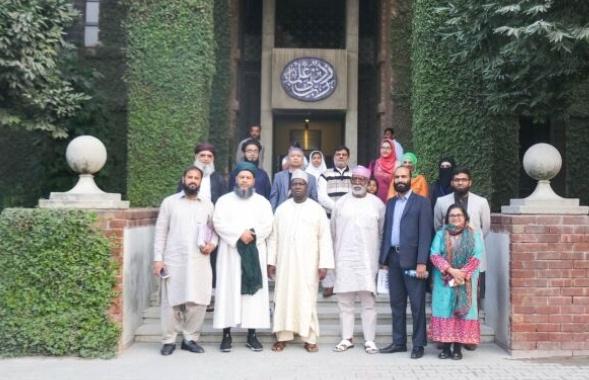
LUMS Religious Society in collaboration with Campus Climate Unit, Dean of Student Affairs Office, hosted a panel talk on November 10, 2018 on the topic, “Global Perspective: Peace Narrative in Accordance with the Qur’an”, which was moderated by revered Islamic Studies faculty member at LUMS, Baqar Hassan Syed. The panel constituted of a delegation of 9 International prominent scholars in the realm of Islamic Theology, International Relations, Islamic World and Comparative Literature, who took out time to join the LUMS community in order to have a timely discussion on this important topic considering the state of the country.
The talk commenced with a discussion on the two known verses from the Qur’an, Chapter 9, Surah At-Tawbah: verse 5 and verse 29, which are typically used to paint Islam as an intolerant and violent religion. The panel swiftly responded to these claims by pressing upon the importance of context when examining sacred texts and different sources, especially with the Quran, and also mentioned the importance of various different conditions and rules under which these commandments were given by God. It then proceeded to explain the situation of war present at the time of revelation of these verses, the reasons for imposing Jizyah (a service tax on non-Muslims) and the groups in reference to which these verses were revealed. The discussion then shifted to the idea of whether it is possible for Non-Muslims to have equal citizenship rights in Islam and how they are often not fulfilled by the Muslim community to which the panel responded with the Islamic viewpoint on the issue. The panelists reiterated the Islamic teachings of tolerance and acceptance, highlighting the examples set forth by the Prophet (peace be upon him) and the caliphs. One notable speaker made a surprising claim that a true Islamic State has more rights for the non-Muslims than those which it has for Muslims themselves. The notable speaker explained his point by referring to a certain prevailing situations in a society where a Muslim is restricted while a non-Muslim is free in his actions. For instance, Alcohol is prohibited for Muslims but not for non-Muslims; Muslims are bound to pay Zakat but non-Muslims are not. This way Muslims may get an upper hand in an Islamic State in some cases, but the opposite could be true in some other cases.
The panel further went on to point out that as God has given Man free will, it is up to him to choose to follow these teachings or not. They also pointed out that the current issue on citizenship rights of non-Muslims is a failure of the Muslim Community rather than the Islamic doctrine. One of the Nigerian speakers also mentioned how the extremist militant organisation, Boko Haram, in Nigeria was killing Muslims and non-Muslims alike in the name of Islam and Quranic teachings and how it appalled him because it was in direct contradiction to the Quran. The panel further mentioned the story of Caliph Umar’s (RA) historic visit to Jerusalem after it came under Muslim control. They mentioned how impressed the Christians were with his character and conduct, so much so that they entrusted the custodianship of the Holy Christian site—the Church of the Holy Sepulcher where Jesus was supposedly buried—to the Muslims. And to this day, two of the custodian families of the site are Muslims which made out to be the perfect example of Islamic teachings of peace and acceptance.
The discussion concluded with how Muslims these days, especially in Pakistan, have become highly emotional and reactionary to these issues and have forgotten the teachings of this beautiful religion. Overall, the panel served as a reminder to the audience about the authentic version of Islam, and offered reassurances to Muslims who constantly have to witness their religion being misrepresented in mainstream media which often goes to the extent that it starts making them doubt their religion.








